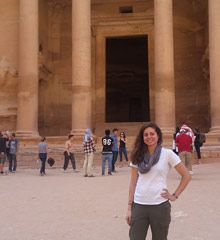Tunnicliff Fellow Roeder, ’17, Discusses Her Jordan Journeye
Related Posts
Connect With Us
Full year abroad is second international experience supported by endowment honoring former Ford Institute director
October 28, 2016
By Chuck Carlson
Sydney Roeder, ’17, stood on a mountain in Jordan last year and looked down at the Sea of Galilee.
“And I’m thinking, ‘Wow, this is really happening,’” she said.
For Roeder, a Midland native who is majoring in anthropology and international studies, the study of the Middle East has long been a passion. But a chance to visit the region and begin the work that she hopes will become a lifetime pursuit? That seemed unlikely.
But as Roeder, a member of the Gerald R. Ford Institute for Leadership in Public Policy and Service, talked about her dream of visiting the Middle East to institute Director Patrick McLean two years ago, a plan began to take root.
“It was the germ of an idea,” McLean recalled. “But this idea kept getting a little bigger.”

Sydney Roeder, ’17, stands in front of the Treasury at Petra, in Jordan, during her study abroad helped in part by the Kim Tunnicliff Endowment.
Finally, the idea became reality, thanks to the Kim Tunnicliff Endowment, which helped send Roeder to Jordan during the 2015-16 academic year.
On October 25, Roeder spoke to an audience in the Bobbitt Visual Arts Center auditorium about her study abroad, which began in August 2015 and concluded in May.
The talk was titled “Ahlan Wa Sahlan: Finding Identity and Living in the Country of Jordan.”
Asked what “Ahlan Wa Sahlan” meant, Roeder smiled and said it meant “welcome” in Arabic.
“And it’s the phrase I heard most often there,” she said.
Roeder was based in Jordan’s capital, Amman, first with a host family and then in an apartment, where she studied the Arabic language and worked with a nongovernmental organization, EcoPeace Middle East, helping to develop such projects as hiking trails and a model farm.
Her Jordan experience also led to a Foundation for Undergraduate Research, Scholarship and Creative Activity project at Albion focusing on the influence of Jordanian tribes on water resources.
“Studies have looked at countries (in the Middle East) that have problems, but no one’s really looked at Jordan,” said Roeder of the country sandwiched in the volatile region that also includes Syria, Iraq, Lebanon and Israel. “They’ve remained stable. They’re doing something right.”
It was while she was in the mountains of Jordan, mapping out hiking trails, that she looked down on the historic and ancient Sea of Galilee and grasped just where she was—and let it all sink in.
“Going to Jordan changed my perspective on how I view the world,” Roeder said. “Increasingly, it shifted my lens from being Western-centric to Middle East-centric.”
And she said she has the Tunnicliff Endowment to thank for that.
“It was really helpful,” she said. “It helped me accomplish what I needed to accomplish.”
And, very likely, it is exactly the student experience Tunnicliff would have looked upon with pride.
Kim Tunnicliff came to Albion in 1984 as a faculty member in the Department of Political Science but then took over as director of the Ford Institute from 1985-99, where he fostered students’ interest in international opportunities. He also served as director of Albion’s Great Lakes Jerusalem Project, where he spent a semester in Israel, Palestine and Jordan.
Tunnicliff was also a member of the Albion City Council from 1994-99, which includes a stint as mayor from 1997-99. From Albion, he moved on to positions at the Associated Colleges of the Midwest, Augustana College in Illinois and the College of Wooster.
In June 2011, he lost his life in a car crash in Mansfield, Ohio; not long after, in cooperation with his widow, Ginny, Ford Institute alumni attracted enough monetary gifts to establish the Kim Tunnicliff Endowment.
The first recipient, David Utrata, ‘15, studied sustainability in South Africa. Roeder is the second recipient. The third recipient will likely be decided by next spring, said Debra Peterson, director of the Center for International Education and Off-Campus Programs.
“It takes a particular kind of student to step outside their comfort zone and do this,” she said.
For Roeder, it was an experience she wants to continue. In fact, after graduation this spring she plans to return to Jordan, get a job and learn more of the Arabic language.
“I miss it a lot,” she said.
Then she plans to return to the U.S. and earn her Ph.D. in anthropology, with an emphasis on environmental anthropology, kinship systems and Middle Eastern studies.
“From there, who knows?” she said.
For Ginny Tunnicliff, who came from her home in Iowa to attend Roeder’s presentation and was joined by her daughter Alison, who lives in Chicago, it was the perfect embodiment of what the endowment was meant to be.
“I’m very pleased, very happy it’s happening and I’m excited we’re able to help students,” Ginny said.
Added Alison: “It’s nice to know my dad’s legacy is living on.”